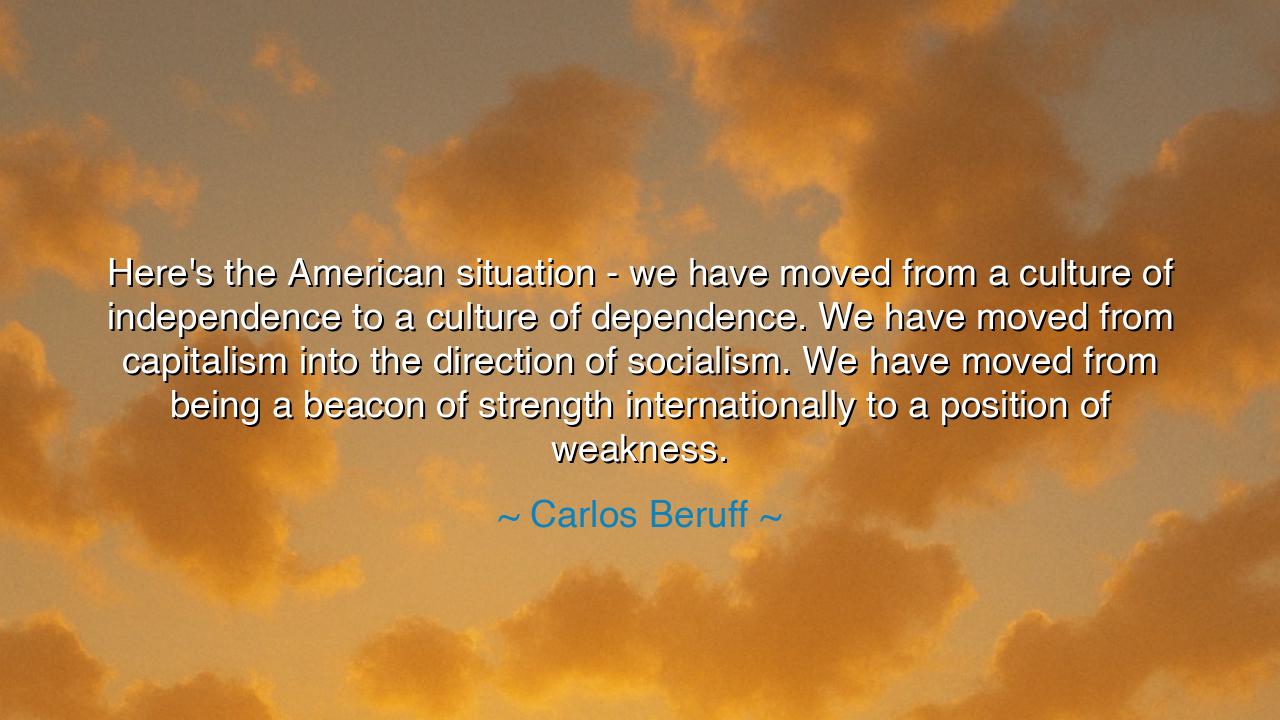
Here's the American situation - we have moved from a culture of
Here's the American situation - we have moved from a culture of independence to a culture of dependence. We have moved from capitalism into the direction of socialism. We have moved from being a beacon of strength internationally to a position of weakness.






When Carlos Beruff declared, “Here’s the American situation — we have moved from a culture of independence to a culture of dependence. We have moved from capitalism into the direction of socialism. We have moved from being a beacon of strength internationally to a position of weakness,” his words struck like a trumpet sounding in the twilight — a warning that a great civilization risks forgetting the very virtues that made it mighty. His statement is not a complaint born of cynicism, but a lament — and beyond that, a challenge. He speaks to a truth older than America itself: that when a people grow too comfortable in the blessings of freedom, they begin to lose the discipline that freedom demands.
The origin of this quote lies in Beruff’s reflections on the state of the modern United States — a nation that once prided itself on self-reliance, enterprise, and strength, but that, in his view, was drifting toward complacency and dependency. A businessman and political figure, Beruff saw in America’s evolution a troubling shift — from the spirit of pioneers who carved a nation from wilderness to a generation that too often looks to others, and to government itself, for rescue and reward. His words were spoken not with hatred, but with sorrow — a call to remembrance, urging citizens to awaken the ancient fire that once burned in their forefathers’ hearts.
In his vision, the “culture of independence” that once defined America was more than economic — it was moral. It was the courage of farmers who risked everything to build homes on untamed soil; the conviction of inventors who failed a thousand times before giving light to the world; the devotion of soldiers who fought not for conquest, but for principle. Yet as comfort replaced hardship and ease supplanted struggle, that independence began to fade. Where once the American spirit said, “I will work, and I will build,” Beruff warns that too many now say, “I will wait, and I will take.” Thus the transformation he describes — from capitalism toward socialism, from self-governance to dependence — is not merely political, but spiritual.
Throughout history, this pattern has repeated itself. The ancients recorded it in the fall of Rome, when a people once famed for discipline and virtue surrendered to indulgence and apathy. Bread replaced honor; entertainment replaced excellence. The legions that once conquered the world grew weak, and the Senate that once defended liberty became a hollow echo of its former self. So too, Beruff’s warning mirrors the old truth spoken by Cicero and Polybius: that the most dangerous enemy of a republic is not a foreign invader, but the decay of its own character. When citizens trade liberty for comfort, and independence for security, they lose both — and the state becomes the master, not the servant.
To say that America has drifted “from a beacon of strength to a position of weakness” is not to scorn her, but to remind her of what she once was — and what she might yet be again. For strength is not only found in armies or wealth, but in the moral fiber of her people. A nation is strong when its citizens believe that their destiny is in their own hands; it is weak when they believe that others must bear their burdens. Beruff’s lament is therefore not about economics alone — it is a cry for the renewal of national character, a plea for the rebirth of courage, discipline, and faith in the power of individual effort.
History offers examples of renewal as well as decline. In the darkest days of the Great Depression, when unemployment spread like a shadow, millions of Americans refused to surrender to despair. They worked, invented, and endured — and through that endurance, they rebuilt a nation. Likewise, after the ashes of World War II, America again rose, not because of government decree, but because of the resilience and innovation of her people. Every generation has faced its trials; what Beruff asks is whether this generation will remember that freedom is not inherited — it must be earned anew, each day, by acts of independence and integrity.
So, my children of the republic, take heed of this teaching: comfort is the silent enemy of freedom. Do not ask what can be given to you; ask what you can give through labor, through sacrifice, through excellence. Let the fire of independence that built your nation burn again in your own heart. Teach your children that dependence may seem safe, but it is the slow death of the soul; that true strength comes from standing, striving, and creating without fear. And when you see your country faltering, do not curse her — rise and remind her who she is. For nations, like men, can be reborn when they remember the virtues that first made them great: courage, industry, and the sacred pride of standing free.






AAdministratorAdministrator
Welcome, honored guests. Please leave a comment, we will respond soon